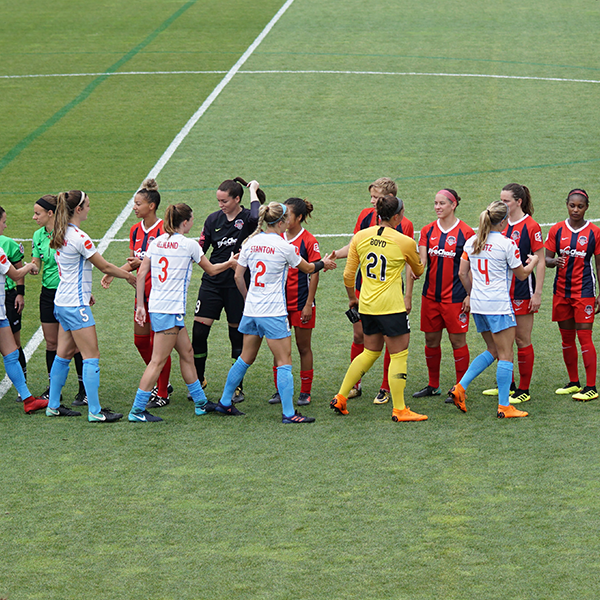In youth sport, there is often a debate about whether the coach is more important than the parents.
Many people believe that parents should step back, because coaches have the predominant influence. Research shows that when parents become too involved, particularly with negative emotional responses, they can hinder the child’s athletic development.
But it’s not so black and white – parents do have a crucial role within the sporting development of their child.
So, how can you get this balance right?
Who come first in sport: the coach or the parent?
The coach clearly has a significant impact on the success and development of the athlete. With a strong relationship and a holistic approach to coaching, young athletes develop as people and play better. A positive coach-athlete relationship helps lead to positive developmental experiences for the athlete.
The research on parents is interesting, with some studies showing that parents’ involvement in sport can negatively impact the child’s development through anger and complaints and failure to respect the role of the coach.
However, current research indicates that a parent’s role is crucial throughout all stages of an athletes career. For example, when parental involvement is positive, it can offer support in terms of development of self-esteem, motivation and social skills. These skills can then transfer to other areas of life. The influential role of a family unit, in particular parents, has been recognised, with focus on how they can impact a child’s attitudes, behaviours, experiences and outcomes across their whole sporting journey.
Parental involvement is also important in elite youth sport, in particular when it comes to supporting the child to reach a professional standard. Research conducted on elite youth academy football players found that the parents have one of the most important roles in player development. Coaches even suggested there is a positive correlation between parental support and likelihood to progress to professional level.
So, a lot of the research on parents and coaches doesn’t necessarily suggest that one is more important than the other, but instead shows that both are needed to best benefit the athlete’s development. So, how do both sides offer the best support they can?
How can parents offer the best support?
What to do
Parents should not “step back”, but instead they should ensure to adapt the nature of their involvement along the journey.
To do this successfully, parents must respond to their child’s preferences, needs and changing goal orientations. During different stages, children need different types of support.
For example:
- During the sampling years (6-12 years old), parents can promote their child's enjoyment by showing care, listening and participating in engaged and informed conversations, understanding their child’s pre-, during and post-competition preferences, and recognising them as more than child athletes.
- In specialising years (12-15 years old), research suggests that athletes prefer parents to help them prepare for competition, provide support and encouragement during competition and offer constructive feedback after competition.
The research shows that not becoming over-involved and just being there to provide emotional and tangible support is the best thing a parent can do for their athlete.
What to avoid
Clearly, parental support is important. However, it’s important that parents don’t live vicariously through their child or put too much pressure on them. Becoming over-involved can create a stressful sport environment by placing too much emphasis on winning and too much importance on participation.
What can coaches do?
To help athletes gain that positive developmental experience, research suggests that coaches need to take advantage of opportunities that are presented from both winning and losing. This can be done through…
- Behaviours that stimulate athletes intellectually
- Engaging athletes in their individual strengths
- Providing appropriate role models
- Establishing a positive coach-athlete relationship
There is also a wealth of research now about how coaches can best help their athletes to learn. For example, coaches should be aware of these areas...
Cognitive Load Theory
This highlights how working memory has a limited capacity. Working memory is where we hold and process new information, and for learning to take place, this information has to be transferred to the long-term memory. This theory is all about acknowledging this and presenting information to athletes in a way that aids and accelerates that transfer to long-term memory. Learn more on using Cognitive Load Theory as a coach here…
Rosenshine's Principles
Rosenshine's Principles of Instruction have the potential to revolutionise coaching. They're based on teaching guidelines underpinned by cognitive science, and we think they can be useful for coaches as well. They include things such as reviewing learning at the start, asking lots of questions and using models. Check out our coach's guide to Rosenshine’s Principles of Instruction to find out more.
The learning styles myth
A vast amount of evidence has found little to no support for the learning styles theory, and reviews of literature clearly show that learning styles are a myth. It is suggested that the implementation of learning styles in sport coaching can even have a negative impact and has become a concern. Therefore, we suggest coaches rely on other techniques to aid learning. Take a look at our blog looking at some of these ideas…
Final thoughts
The vital message here is that while coaches are clearly important for the physical and psychosocial development of youth sport participants, so too are parents.
Parents should not feel like they need to step back, but instead be prepared to adapt their involvement in their child’s sport. Coaches should ensure they are educating themselves on the ways they can best help their athletes to learn and grow. Both support from the coach and parent will help lead the athlete to become the best they can be.
At the end of the day, athletes should have a great support system and team they can rely on. Want to make a sport and performance psychologist part of your athlete’s team? Get in touch to see how we can help…





